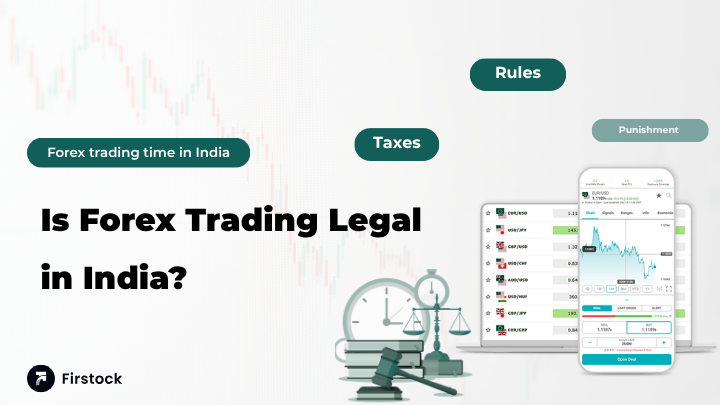Is Forex Trading Legal in India? 5 Things to Know

Is Forex Trading Legal in India? Complete Guide for 2025
Have you also ever wondered why forex trading is talked about by so many people across the world yet in India, it seems to be in a legal gray zone? You’re not alone. Forex trading in India is like a dream when there is the promise of global returns and 24-hour market action. It is important to first know the legality, tax implications, and risk involved before leaping into it.
A good plunge into the reality of the question -Is forex trading legal in India?- and make all the misunderstanding once and for all clear.
What is Forex Trading?
Forex trading is also known as foreign exchange trading which is the process of selling and buying of currencies. To use it as an example, when you are sure that the US dollar will rise against the Indian rupee, then you can buy USD/INR. Sell it at a profit in an increase of dollars.
Put simply, it is comparable to using your currency when you are to visit another country, except that you are not going once, but doing it as a business strategy to make money.
How Does Forex Trading Work?
The forex market is a global market which is the largest financial market in the world as today over 6.6 trillion of forex is traded. In the online platforms or even through brokers, traders make speculations based on the movements of currency.
Forex trading in India is conducted under the watch of RBI and SEBI in exchanges, such as NSE, BSE and MCX-SX.
Is Forex Trading Legal in India?
The answer to the question is in the short term - Yes, forex trading is legal in India, but there are certain limitations.
In India, RBI and SEBI state that only Indian exchanges allow people to trade in forex, and only in currency pairs involving the Indian rupee (INR).
That means you can trade:
- USD/INR
- EUR/INR
- GBP/INR
- JPY/INR
Trading other international pairs like EUR/USD or GBP/USD through foreign brokers is illegal for Indian residents.
What Makes Forex Trading Illegal in India?
By transacting with foreign forex brokers who are not registered by the SEBI, you are committing a crime of breaching the Foreign Exchange Management Act (FEMA), 1999.
These trades are referred to as offshore transactions and they do not come under the regulatory system of India.
In other words, it is gambling at an international casino with Indian currency. It cannot be regulated by the government hence it is illegal.
The Role of RBI and SEBI in Forex Trading
- RBI (Reserve Bank of India): Regulates all foreign exchange transactions under FEMA. It ensures that forex activities don’t harm the country’s financial stability.
- SEBI (Securities and Exchange Board of India): Monitors brokers and trading platforms to ensure transparency and protect investors.
Together, they create a safe and legal environment for forex trading in India through authorized exchanges.
Legal Ways to Trade Forex in India
You can legally trade forex in India through:
- Recognized exchanges: NSE, BSE, and MCX-SX.
- Registered brokers: Only SEBI-registered brokers are allowed.
These platforms use currency futures and options, ensuring compliance with RBI’s guidelines.
Currency Pairs Allowed for Trading in India
As per SEBI regulations, traders can trade the following pairs:
INR-based pairs:
- USD/INR
- EUR/INR
- GBP/INR
- JPY/INR
Cross-currency pairs (allowed from 2018):
- EUR/USD
- GBP/USD
- USD/JPY These can only be traded on recognized Indian exchanges.
What is the Punishment for Forex Trading in India?
Engaging in illegal forex trading can lead to severe penalties under FEMA.
Possible punishments include:
- A monetary penalty up to ₹10 lakh or more.
- If the violation continues, an additional ₹10,000 per day fine.
- In extreme cases, imprisonment may also apply.
So, if you’re trading with foreign brokers or through unregulated apps, it’s not worth the risk.
Tax on Forex Trading in India
Yes, profits from forex trading in India are taxable.
Here’s how it works:
- If trading is speculative (intra-day) → Taxed under ‘speculative income’, at regular income tax slab rates.
- If trading is non-speculative (futures & options) → Taxed as business income.
- You can deduct expenses like internet, brokerage, or electricity bills related to trading.
Always report your forex trading income in your ITR to stay compliant.
Forex Trading Time in India
The forex market runs 24 hours a day, but in India, the timing depends on the exchange.
- INR-based pairs: 9:00 AM to 5:00 PM (Monday to Friday)
- Cross-currency pairs: 9:00 AM to 7:30 PM
So, while global forex runs round-the-clock, forex trading time in India is limited to official exchange hours.
Popular Forex Brokers in India (RBI-Approved)
If you’re trading legally, here are a few trusted SEBI-registered brokers:
- Zerodha
- Upstox
- ICICI Direct
- HDFC Securities
- Sharekhan
These brokers offer forex trading on recognized Indian exchanges, making them 100% compliant.
5 key Difference Between Legal and Illegal Forex Platforms
If your broker promises “unlimited leverage” or accepts deposits in crypto or international wallets, that’s a major red flag.
How to Start Legal Forex Trading in India
Here’s a quick step-by-step guide:
- Open a trading account with a SEBI-registered broker.
- Complete KYC verification.
- Fund your account in INR.
- Choose a currency pair (e.g., USD/INR).
- Start with demo trading to learn strategies.
- Begin live trading with small capital.
Remember — patience and discipline are more valuable than luck in trading.
Risks and Challenges in Forex Trading
Even though forex trading can be profitable, it’s not a guaranteed money machine.
Risks include:
- High volatility: Currencies can change rapidly due to global events.
- Leverage risk: Borrowed funds can amplify losses.
- Emotional decisions: Fear and greed can lead to poor trading moves.
Think of forex trading like sailing in the ocean — the waves can be thrilling but dangerous without proper navigation.
Final Thoughts: Should You Trade Forex in India?
So, is forex trading legal in India? Yes, but only through regulated brokers and INR-based pairs.
If you stick to the legal route, forex trading can be an exciting way to diversify your portfolio. But remember — never trade through offshore or unregulated apps.
Stay informed, trade smartly, and always respect the laws set by RBI and SEBI.
Indian Stock Broker - Firstock’s Opinion: Forex trading in India isn’t illegal — it’s just regulated. Follow the right channels, understand the rules, and trade wisely within the law to enjoy the benefits of the global currency market.
FAQs
1. Is forex trading legal in India?
Yes, it’s legal if done through SEBI-registered brokers and Indian exchanges, and only in INR-based currency pairs.
2. What is the punishment for forex trading in India?
Unlawful forex trading would lead to a fine of up to 10 lakh or imprisonment under the FEMA Act.
3. What is the tax on forex trading in India?
Taxation on forex income is either under the business income or under the speculative income, depending on the nature of the trade.
4. What is the forex trading time in India?
Trading in the case of INR pairs should be within 9:00 AM and 5:00 PM, and in the case of cross-currency pairs, 9:00 AM and 7:30 PM.
5. Can I trade forex with international brokers from India?
No, trading through foreign or unregulated forex platforms is illegal for Indian residents.





